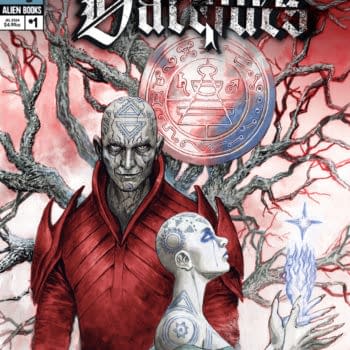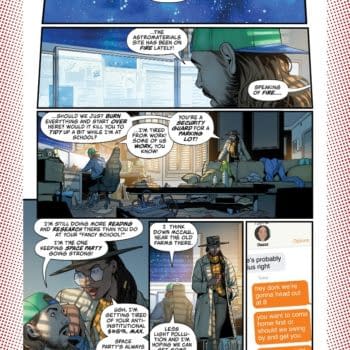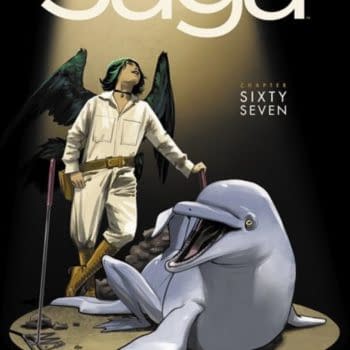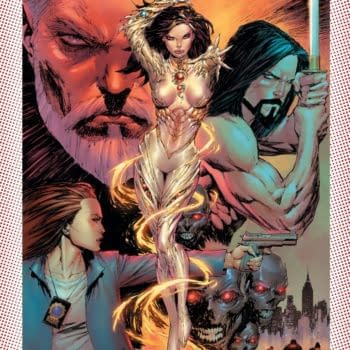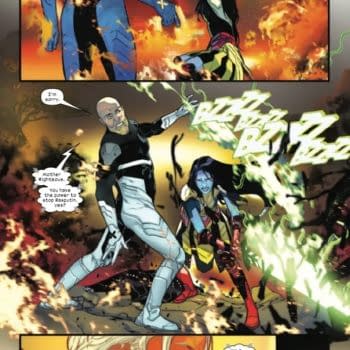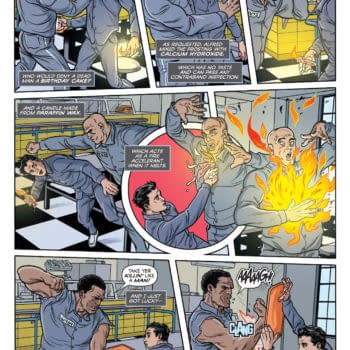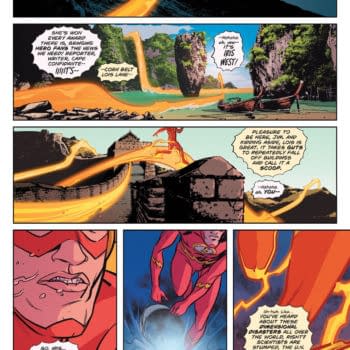Posted in: Comics, Recent Updates | Tagged: Comics, covers, marvel. dc, uncanny avengers, variant, walking dead
Rich Johnston On Why Variants Are The Worst Thing To Happen To Comics

For those who weren't with us for that period, comic books were hyped up and sold at large markups for the traditional first issues and first appearances, but also for multiple covers – the intention is that fans would buy all the covers, bumping sales up remarkably, with rare chase covers that had to be pursued. And there were the innovative cover features, glow in the dark, embossed, silver, silver embossed, hologram, bit of purple plastic stuck to the front, but very little of this approach ever focused on content. It didn't matter if the comic was good or not, only that the cover was cut into the shape of a duck billed platypus.
The whole thing crashed of course, as the market over-saturated, people could no longer afford to collect all the covers and instead decided to buy none of them. Suddenly shops were stuck with huge amounts of comics they could not sell, and retailers, distributors and publishers went bust.
It was horrible, and comic book speculation was, deservedly, seen as the cause of it all.
So when speculation began to rise again in the two-thousands, it was seen as the worst of all things. And no right-minded individual would support such a thing. So naturally I did.
But things were suddenly different, rather hot comics than being based on comics frippery or first appearances, comic book speculation was rewarding the actual quality of the comics – especially unexpectedly good comics. It wasn't a glow in the dark cover that led prices but a damn good story that no one was expecting. Ultimate Spider-Man, New X-Men, Daredevil – as Marvel tried to pull itself up from its self-inflicted bankruptcy, their early attempts at trying something new were conservatively ordered by retailers who then found they had smash hits on their hands. And the prices rocketed. Over the years, as retailers learned how to order New Marvel titles, that activity switched to Image Comics, now putting out new unfamiliar comics by new unfamiliar creators and as a result poorly ordered – so when the retailers discovered they had a smash on their hands, sales and value rocketed. The Walking Dead was the poster girl for this, but Chew, Nonplayer, Fatale, Skullkickers and more have followed up in this fashion. Bleeding Cool have reported this, followed up on it, hell maybe even caused it in a couple of places. And the rare variant cover is part of it, the convention or the store exclusive version is an easy way to create a little pizazz, for highlighted issues and special event, but they don;t happen too often. The speculation focused on the content of the book.
But of late, things are taking a worrying turn. The RRP variant, where retailers who attended a certain event received a special version of a comic, was followed by the 1:200 variant, where retailers had to order a tonne of comics to get a special version, joined by 1:150, 1:100, 1:50, 1:25 and :10 covers often on the same book. Again and again for first issues, for second, for third issues, across every line where every book is getting relaunched.
Walking Dead #100 is a milestone as well. Eleven different covers – fifteen in the end – took a book that was starting to creep into the top thirty and rocketed it to first place outselling it's nearest rival by a factor of two, at least. You can see, at that moment, someone at Marvel going "well, how can we do that then?" And before you know it, Uncanny Avengers has eleven covers… for now. And it has worked, the comic is expected to sell over four hundred thousand, on the back of extreme discounting and variant covers. All the Marvel NOW! books are joining this game, as well as covers that are tagged to best selling comics – you only get the variant cover if you match your sales of the normal cover to a better selling comic. Even Marvel's charity drive for the Susan Komen campaign for Breast Cancer Awareness Month is tied in this way – retailers can only order these charity editions if a retailer orders a large amount of the normal cover version.
There is certainly a demand for these covers, people willing to pay inflated prices – and retailers happy to order and sell at those prices too. But two things are waiting to happen, just as they did in the nineties.
The first is, given so much to collect, and a tendency for rare variant covers to decrease in value with time, as new books come onto the market, fervent collectors will look at their collection, see it impossible to complete with the increasing variant covers on so many books in so many forms, while the value of their collection falls with every month, that they will just stop collecting. Variants, certainly, but maybe comics as a whole.
And secondly, retailers are ordering huge numbers of comics, far more than they can sell, to get these rare covers. Which means standard comics go unsold, or hit the quarter bins fast. Which brings down the perceived value of buying a new, standard, every day comic. And eventually the penny drops – why buy a full priced comic when in a few months you can buy it for pennies?
When these combine, and people stop buying the variant comic for a massive markup, leaving retailers stuck with tonnes of unsellable comics – because customers know that if they wait, they'll get a bargain – then that is the end time for the comic shop.
Sensible comic shops can manage this kind of issue of course. They won't go overboard on variants, they won't get stuck with stock, they are responsive to their customers needs. But not every shop can or will do this. Some are basing their business plans and forecasts on the variant model of selling comic books.
But if it goes on like this, it will collapse. And then so will the shops that depend on them now. Not the majority of shops, maybe, but the direct market is not the most stable beast. Can it really survive, at this moment, ten percent of shops going bust owing tens of thousands of dollars to publishers and distributors to get variant covers that they now can't sell?
There are many harmless variant cover systems out there and publishers that manage their exposure well. And specific comics and lines that depend on a small audience buying multiple copies in a stable fashion. But the increase in covers, the increase in rare chase covers, the increase in comics that get variant covers, the increase in supply when demand is stable, and the mainstreaming of this behaviour to the big guys points in one direction.
Will history repeat itself? It has a tendency to do that, you know.







